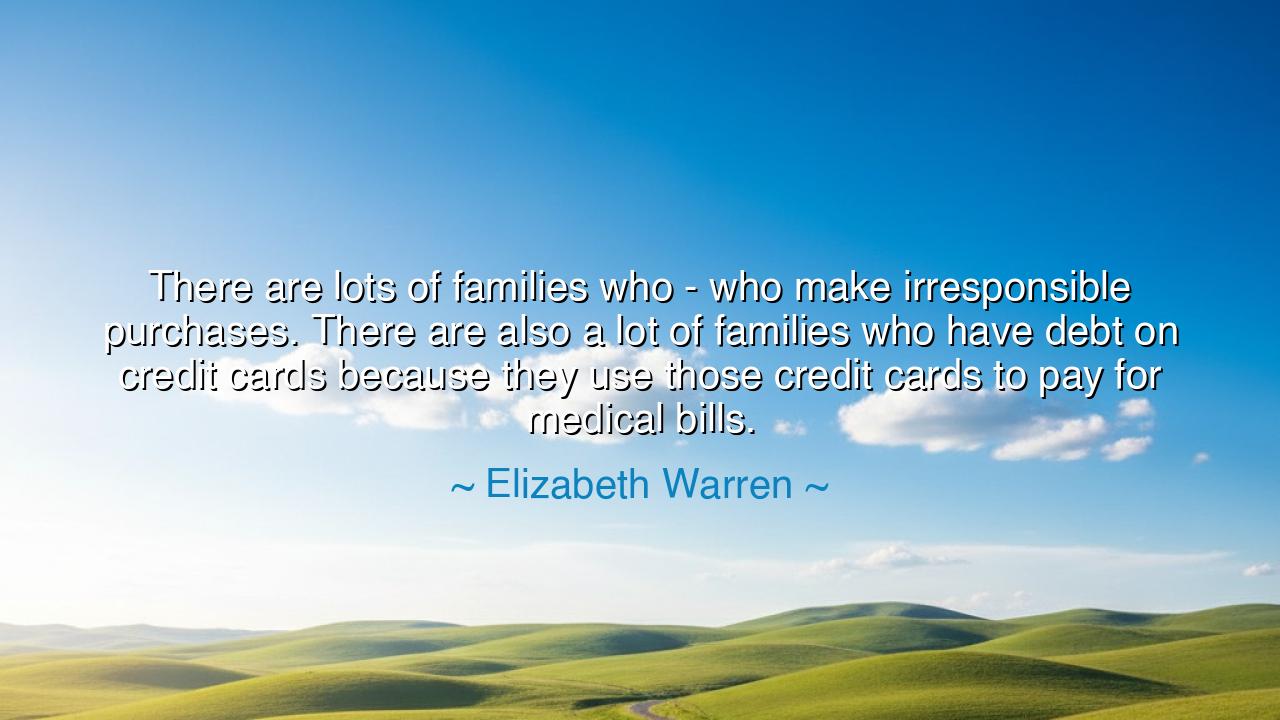
There are lots of families who - who make irresponsible
There are lots of families who - who make irresponsible purchases. There are also a lot of families who have debt on credit cards because they use those credit cards to pay for medical bills.






When Elizabeth Warren declared, “There are lots of families who – who make irresponsible purchases. There are also a lot of families who have debt on credit cards because they use those credit cards to pay for medical bills,” she was not merely describing the burden of debt. She was exposing a deeper truth about justice, compassion, and the uneven weight that societies place upon their people. In her words lies both the rebuke of wastefulness and the lament for those who suffer not because of luxury, but because of necessity.
The first truth she names is that some families fall into debt through irresponsible purchases. This is as old as humanity itself: the temptation of desire, the indulgence in things that glitter but do not last, the willingness to trade tomorrow’s bread for today’s fleeting pleasure. Such choices, she acknowledges, carry their own consequences. The ancients too warned of this; Proverbs speaks of the fool who squanders his wealth, and the philosophers of Greece reminded their pupils that discipline in desire was the root of freedom.
Yet Warren does not stop there. She reminds us of a second, graver truth: there are families whose credit card debt is not born of indulgence, but of survival. They do not borrow to adorn themselves with jewels or gadgets, but to pay for medical bills, for the healing of their bodies and the preservation of their lives. This is no folly, but desperation—an act of parents who will trade years of debt to save a child, or of workers who would rather endure poverty than leave a sickness untreated. In such cases, debt is not a mark of shame but of sacrifice.
History itself shows us how societies reveal their values in how they treat the sick. In ancient Rome, the wealthy had access to physicians, but the poor often suffered unattended. In medieval times, monasteries created hospitals where care was given freely, for they believed that tending the ill was a sacred duty. Contrast these with modern systems where a single accident, a single diagnosis, may plunge a family into decades of financial bondage. Warren’s words reveal this tragedy: that in the wealthiest of nations, families fall into ruin not from vice but from the cost of healing.
The deeper meaning of her statement is a call to discernment and compassion. We must not judge all debt as the fruit of irresponsibility, nor all poverty as the mark of laziness. The world is filled with unseen burdens—of illness, of injury, of chronic conditions—that drive even the prudent into despair. To ignore this distinction is to close our eyes to justice, to treat the struggling mother the same as the wasteful gambler. True wisdom demands that we see the difference, that we respond with mercy rather than condemnation.
For us, the lesson is clear: we must cultivate both personal responsibility and social responsibility. On the one hand, we must guard against reckless spending, against the temptation to live beyond our means. On the other, we must also demand a society where the sick are not punished with ruin for seeking care, where medical debt is not a chain around the neck of the vulnerable. Both truths must stand together, for only then do we honor both discipline and compassion.
Practical wisdom follows: in your personal life, live simply, resist unnecessary indulgence, and build a foundation of financial prudence. But in your civic life, raise your voice for systems that protect families from being broken by medical costs. Support reforms, institutions, and leaders who recognize that health is not a luxury but a right, and that debt should never be the price of survival.
Thus, Warren’s words endure as both warning and plea. Debt born of folly must be corrected; debt born of necessity must be relieved. If we fail to see the difference, we blind ourselves to justice. Let us, therefore, walk wisely in our choices, and work tirelessly for a world where families need not choose between health and ruin. In this lies the true harmony of responsibility and compassion—the foundation of a society both strong and humane.






AAdministratorAdministrator
Welcome, honored guests. Please leave a comment, we will respond soon